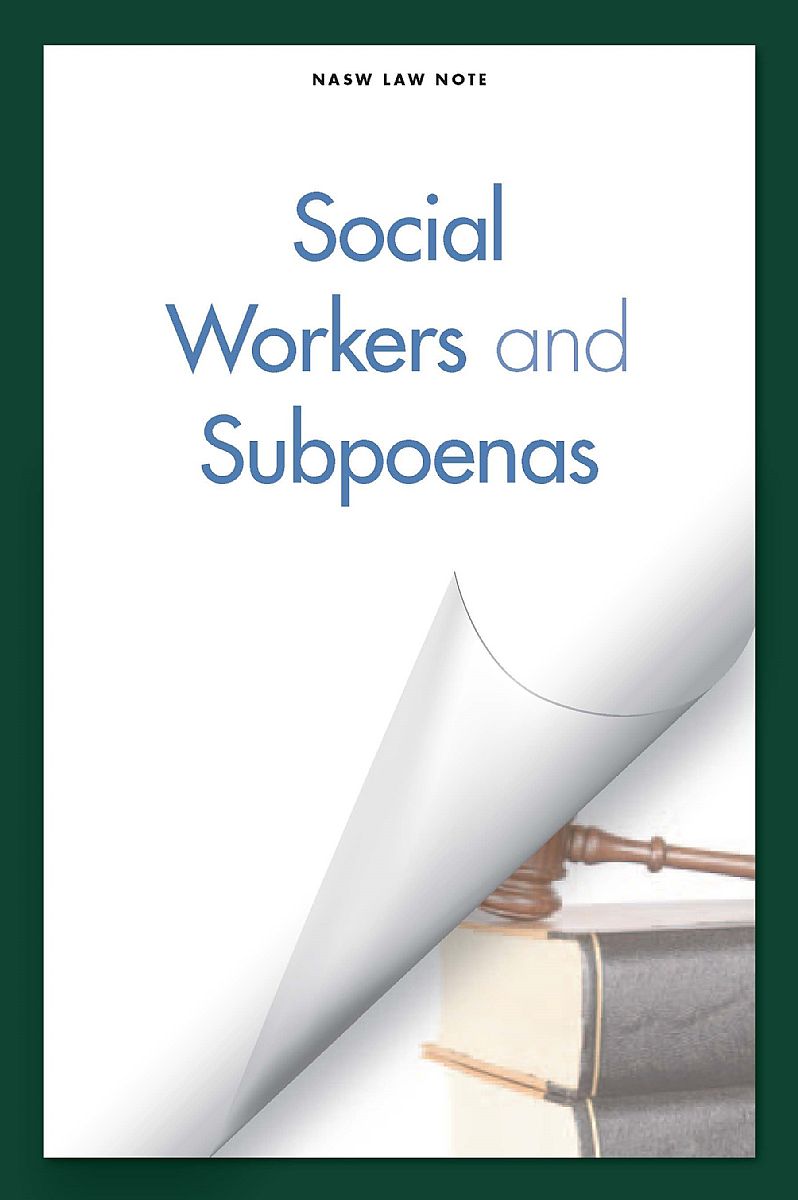
NASW Law Note: Social Workers and Subpoenas
Author: NASW General Counsel, NASW Legal Defense Fund
Page Count: 52
ISBN: 978-0-87101-431-3
Published: 2011
Item Number: 4313
$22.99
Social Workers and Subpoenas is part of a series of General Counsel Law Notes written with the support of the NASW Legal Defense Fund.
Social workers are becoming involved in their clients’ lawsuits with ever greater frequency. Domestic relations matters, drunken driving accidents, sexual harassment, and other work-related problems can lead to litigation for people who are in family counseling, therapy, or employee assistance programs. Social workers are required by law to report known acts and suspicions of child or elder abuse and may have to testify about the reports they file. Troubled clients may be involved in legal proceedings such as child custody disputes; workers’ compensation hearings; civil damage suits; or criminal matters, including domestic violence and violation of probation orders.
This law note provides practitioners with a thorough grounding in these and other legal matters that may involve them in litigation and result in subpoenas for their records. Starting with a definition of what subpoenas are – the different types, how they are issued and served, their varying scopes – Social Workers and Subpoenas goes on to cover:
- responding to a subpoena (including social workers’ responsibilities, objecting to a subpoena, protective orders, and motions to quash or modify);
- applying and waiving client privilege;
- the bearing of NASW Code of Ethics and HIPAA standards on decisions to release or withhold information; and
- the costs associated with compliance.
Also included in this invaluable resource are Section 1.07 of the NASW Code of Ethics (Privacy and Confidentiality), a complete list of relevant state subpoena statutes, and the United States Code Annotated Federal Rules of Civil Procedures for the U.S. District Courts.
Readers of Social Workers and Subpoenas will have an authoritative grasp of the concepts and rules on which subpoenas are based. Armed with this knowledge, social workers will be in a position to better serve the needs of their clients by understanding the purpose of any subpoena with which they are served, applying the legal and ethical rules that are relevant in their particular case, responding appropriately to the subpoena, and formulating cogent legal questions to put to attorneys.
The NASW General Counsel Law Note series provides information to social workers about legal topics of concern to the social work profession. The Law Notes are developed with the support and financial assistance of the NASW Legal Defense Fund (LDF). Contents vary by title, but generally include legal information, civil procedure, contracts, legal methods, and glossaries. Checklists, timetables, case law, and other resources help social workers understand and exercise their legal rights and responsibilities as well as the rights and responsibilities of their clients.
Introduction
What Is a Subpoena?
Types of Subpoenas
Subpoena ad testificandum
Subpoena duces tecum
How Are Subpoenas Issued?
How Is a Subpoena Served?
Scope of a Subpoena
Responding to a Subpoena
Social Worker Responsibilities
Objecting to a Subpoena
Written Objections
Protective Order
Motion to Quash or Modify
Applying and Waiving Client Privilege
Social Workers, HIPAA, and Subpoenas
NASW Code of Ethics Standard for Release of Client Information
HIPAA Standards for Disclosure of Client Information in Legal Proceedings
Disclosure Based on a Court Order
HIPAA Rules for Disclosure Based on a Subpoena
Disclosure of Records and State Law
Disclosure of Records and Federal Law
Disclosure of Records and Mixed State-Federal Law Cases
HIPAA and Waiver of Privilege
Ex Parte Interviews
Costs of Compliance
Unretained Expert’s Opinion
Contempt of Court
Fees
Conclusion
Endnotes
Appendix A: NASW Code of Ethics: 1.07 Privacy and Confidentiality
Appendix B:- State Subpoena Statutes
Appendix C: Federal Rules of Civil Procedure
Social workers are becoming involved in clients’ lawsuits more frequently than they would like. Domestic relations matters, drunk driving accidents, sexual harassment, or other work-related problems can lead to litigation for clients who are in family counseling, therapy, or employee assistance programs. In addition, social workers are required to report acts or suspicions of child or elder abuse and may have to testify about these reports. Further, troubled clients may be involved in legal proceedings such as child custody disputes, workers’ compensation hearings, civil damage suits, or criminal matters including domestic violence and violation of probation orders.
These and similar matters may result in litigation involving social workers and subpoenas for their records. The type of subpoena, whether it must be obeyed, whether the client has provided a valid written release of information, and whether original records must be provided are some of the issues that must be addressed. The first step in sorting out how to treat a subpoena is to understand the concepts and rules on which a subpoena is based. Armed with some information about the purpose of a subpoena and the legal and ethical rules that generally apply, social workers can analyze how to respond and also can formulate legal questions for consultation with an attorney.
